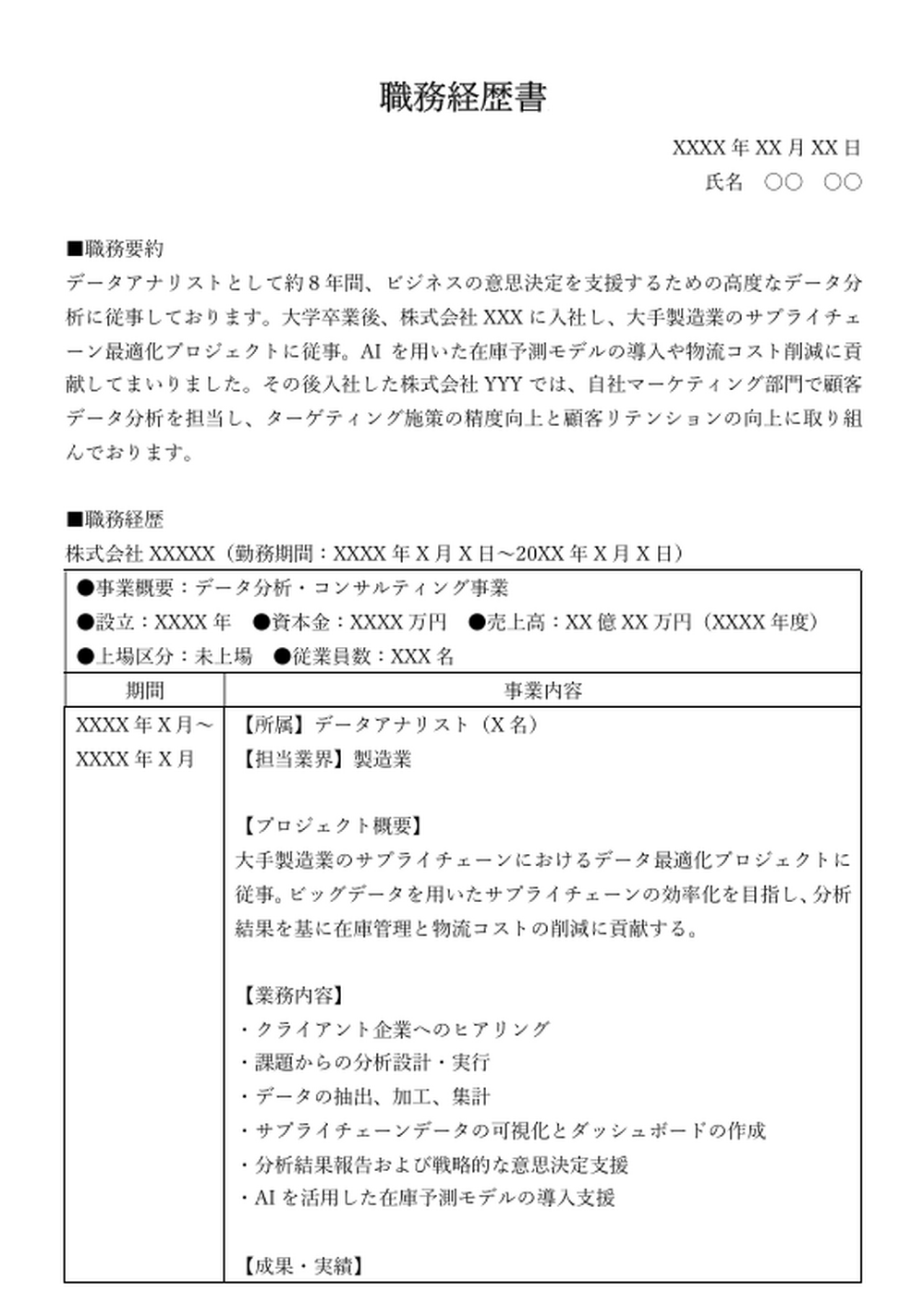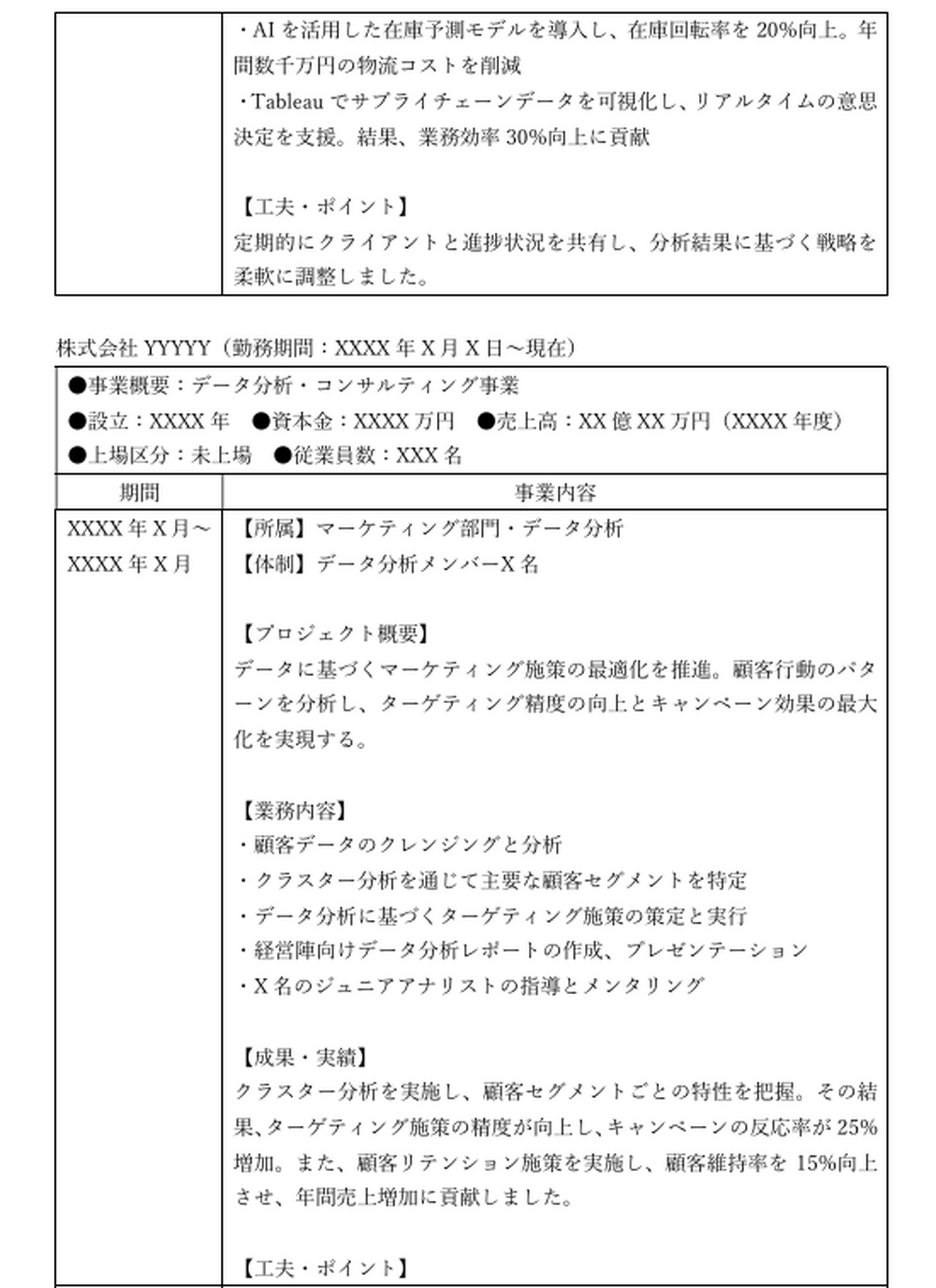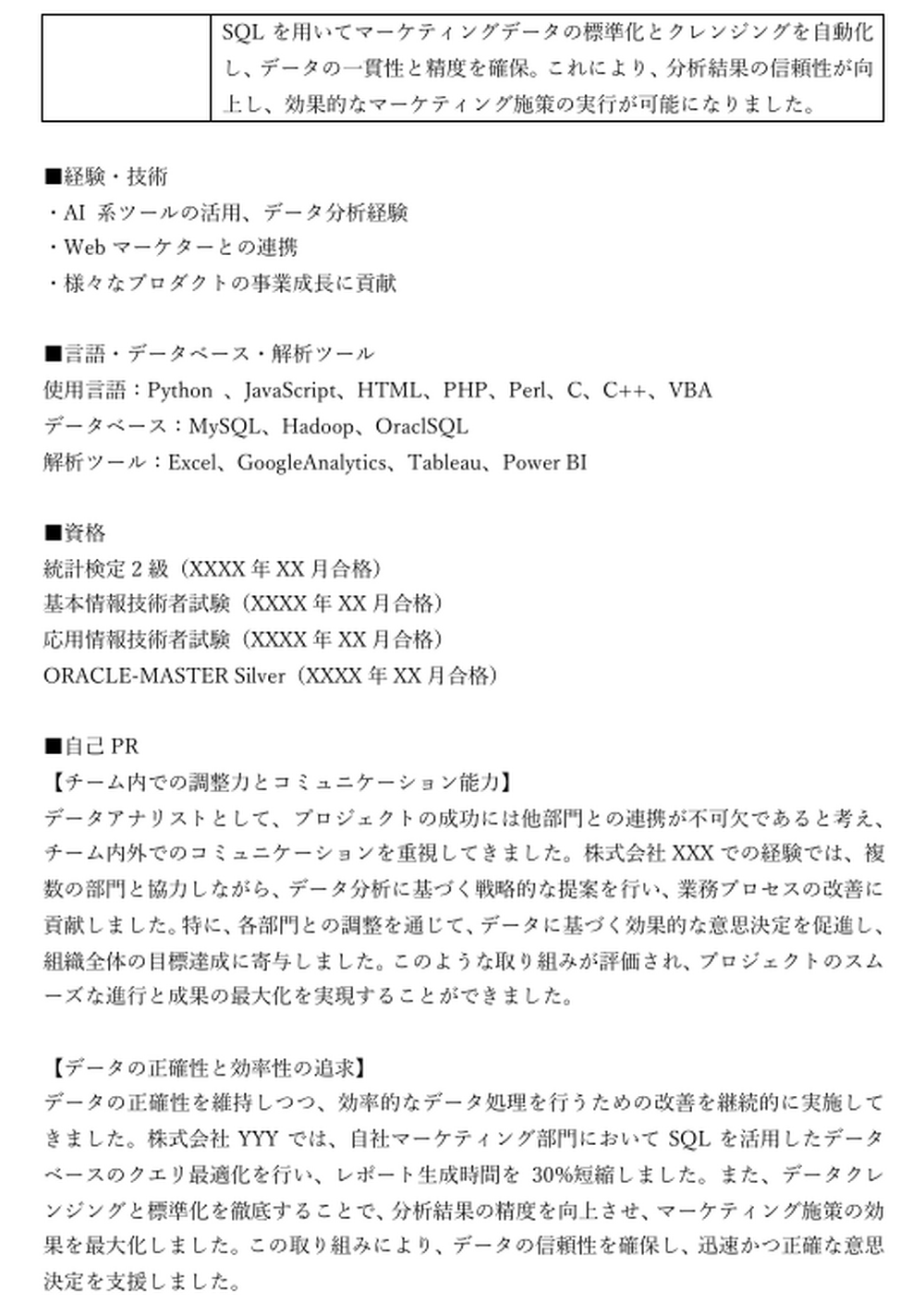データアナリストとしてのキャリアを活かして転職を考える際、「職務経歴書」は非常に重要です。これまでの経験やスキル、成果を採用担当者に効果的に伝えるためには、職種に応じた適切な書き方が求められます。
そこで今回は、データアナリストが転職時に押さえておくべき職務経歴書の作成方法を詳しく解説します。具体的な例文も紹介しているので、転職を成功させたい方はぜひご活用ください。

データアナリストとしてのキャリアを活かして転職を考える際、「職務経歴書」は非常に重要です。これまでの経験やスキル、成果を採用担当者に効果的に伝えるためには、職種に応じた適切な書き方が求められます。
そこで今回は、データアナリストが転職時に押さえておくべき職務経歴書の作成方法を詳しく解説します。具体的な例文も紹介しているので、転職を成功させたい方はぜひご活用ください。
When considering a career change as a data analyst, the “resume” is extremely important. In order to effectively communicate your experience, skills, and accomplishments to hiring managers, you need to write in an appropriate manner for the position.
In this article, we will explain in detail how to write a resume that data analysts should keep in mind when changing jobs. We also introduce specific examples, so if you want to succeed in your new job, please take advantage of this article.

ここからは、まずデータアナリストが職務経歴書に最低限記載しておくべき、以下7つの項目について詳しく解説します。
職務経歴書の1ページ目の冒頭には、まず「職務経歴書」というタイトルを太字で記載します。日付と氏名は右上に配置し、日付は提出日や郵送日を記入しましょう。日付は西暦・和暦のどちらでも構いませんが、書類全体で形式を統一することが重要です。特に、職務経歴や資格取得の年号と日付の形式が一致しているか、十分に確認しましょう。
このタイトル、日付、氏名は、人事担当者が最初に目にする部分です。ここに誤りや不備があると、書類全体に目を通してもらえないことや、悪い印象を与えるリスクがあります。
さらに、名前が読みづらい場合は、漢字の後にふりがなを( )で付けると、より親切です。
職務要約は、これまでのキャリアを簡潔にまとめる重要な項目です。データアナリストとしての経験年数、主な業務内容、得意分野、特に力を入れてきたスキルや使用ツールなどをわかりやすく記載しましょう。
職務要約では、自身の強みや企業に対してどのように貢献できるかを端的に伝えることが求められます。また、複数の職務経験がある場合は、応募先の職務に関連する経験を中心にまとめると良いでしょう。
文章が長くなりすぎると要点を整理できない印象を与える可能性があるため、250文字程度でシンプルにまとめることが大切です。
職務経歴の項目では、これまでの勤務経験を明確かつ簡潔に伝えることが大切です。勤務先の正式名称や勤務期間、担当した役割や役職、具体的な業務内容や達成した成果を含めましょう。採用担当者が重要なポイントをすぐに把握できるよう、箇条書きなどを活用して見やすく整理することを心がけてください。
記載形式には自由度がありますが、代表的なものとして「編年体形式」「逆編年体形式」「キャリア形式」の3つがあります。
最も一般的なのは「編年体形式」ですが、自分のキャリアに合わせて最適な形式を選びましょう。選び方のポイントは以下のとおりです。
職務経歴を書く際には、単に業務内容を列挙するだけでなく、成果を上げるためにどのような工夫や努力をしたのかを具体的に示すことも大切です。
なぜその成果を達成できたのか、その過程でどのような行動を取ったのかを明確にアピールすることで、採用担当者があなたのキャリアをより具体的にイメージしやすくなります。
転職後の職種によって必要とされるスキルレベルは異なりますが、データ分析の分野では、幅広い知識を持っていることが重要な評価ポイントとなります。そのため、応募先企業のニーズに合わせて、自分が扱えるツールやソフトウェアをできるだけ具体的に記載することが大切です。
例えば、データアナリストからさらに上位のデータサイエンティストを目指している場合、データ解析や統計のスキルに加えて、プログラミング言語や機械学習の知識をアピールすると、好印象を持たれやすくなります。
さらに、特定の業界や分野に特化した経験がある場合は、それを強調することで、自身の強みをより効果的に伝えることができます。
職務経歴書の資格欄には、現在保有している資格を、取得・合格した順に正式名称で記載しましょう。資格に対する表記は、次のように使い分けるのが一般的です。
もし、記載できる資格や免許がない場合は、空欄にせず「特になし」と明記することが大切です。空欄にすると、書き忘れと誤解されたり、雑な印象を与えたりする恐れがあります。
また、まだ取得していないが、結果待ちや取得予定の資格がある場合は、「〇〇資格 取得予定」や「〇年〇月に〇〇資格を受験予定」と記載すると良いアピールになります。ただし、資格欄には主にすでに保有している資格を記載するのが基本です。取得予定や見込みの資格については、自己PR欄に記載する方が無難でしょう。
自己PR欄は、職務経歴書の中でも特に重要な部分です。ここでは、自分の強みやスキル、仕事に対する姿勢を具体的に示し、応募先企業でどのように貢献できるかをアピールしましょう。
PRポイントは2〜3つに絞り、それぞれを1行程度で簡潔にまとめます。その後、ポイントを裏付ける具体的なエピソードや事例を3〜5行で説明すると、読みやすく、かつ効果的です。

We will now begin by detailing the following seven items that a data analyst should include in his or her resume at a minimum.
At the beginning of the first page of your resume, begin with the title “Curriculum Vitae” in bold letters. The date and name should be placed in the upper right corner, and the date should be the date of submission or mailing. The date can be in either Western or Japanese calendar, but it is important to keep the format consistent throughout the document. In particular, make sure that the format of the date is consistent with the years of your work history and qualifications.
The title, date, and name are the first parts of the document that HR personnel will see. If there are errors or inadequacies here, you risk not having them read through the entire document and creating a bad impression.
Furthermore, if the name is difficult to read, it is more helpful to put furigana ( ) after the kanji character.
The job summary is an important section that briefly summarizes your career to date. Include your years of experience as a data analyst, your main job responsibilities, areas of expertise, skills you have focused on, and tools you have used.
In the job summary, you are expected to convey your strengths and how you can contribute to the company in a straightforward manner. If you have multiple work experiences, it is a good idea to focus on those experiences that are relevant to the position for which you are applying.
If your resume is too long, it may give the impression that you cannot organize your main points, so it is important to keep it simple and to the length of about 250 words.
In the work history section, it is important to provide clear and concise information about your past work experience. Include the full name of the company, the length of time you worked there, the roles and positions you held, the specific tasks you performed, and the results you achieved. Be sure to organize your resume in an easy-to-read format, using bullet points so that the hiring manager can quickly grasp the important points.
There are three typical formats: “chronological,” “reverse chronological,” and “career.
The most common format is the “chronological” format, but you should choose the format that best suits your career. The key points for choosing the best format are as follows
When writing your work history, it is important not only to list your work, but also to show how you have made efforts to achieve results.
By clearly demonstrating why you were able to achieve the results you did and what actions you took in the process, it will be easier for the hiring manager to get a more concrete picture of your career.
While the skill level required for each new position will vary, having extensive knowledge in the field of data analysis is an important evaluation point. Therefore, it is important to be as specific as possible in describing the tools and software you can handle to meet the needs of the company you are applying to.
For example, if you are aiming to become a data scientist, which is a higher level from data analyst, you are more likely to make a good impression if you show your knowledge of programming languages and machine learning in addition to your data analysis and statistics skills.
Furthermore, if you have specialized experience in a particular industry or field, highlighting this will help you communicate your strengths more effectively.
In the qualifications section of your resume, list your current qualifications by their official names in the order in which they were obtained or passed. It is common practice to use the following notations for qualifications
If there are no qualifications or licenses that can be listed, it is important to state “none in particular” instead of leaving it blank. Leaving it blank may be misunderstood as forgetting to write it down or may give the impression that it is a clutter.
If you have a qualification that you have not yet obtained but are awaiting results or plan to obtain, it is a good idea to state “planning to obtain 00 qualification” or “planning to take 00 qualification in 00 year 00 month” to make a good appeal. However, the basic rule is to list qualifications you already possess in the “Qualifications” column. It is safer to list qualifications that you plan to acquire or expect to acquire in the self-public relations section.
The self-promotion section is one of the most important sections of the resume. In this section, you should specifically present your strengths, skills, and attitude toward work, and show how you can contribute to the company to which you are applying.
Narrow your PR points down to two or three, and briefly summarize each in about one line. After that, provide three to five lines of specific episodes or examples to support your points, which is both easy to read and effective.

データアナリストが職務経歴書を作成する際にはいくつかのポイントがあります。ここでは、特に意識すべきポイントを4つ紹介します。
職務経歴書では、データアナリストとしての分析スキルや実績をできる限り具体的に記載することが求められます。
例えば、使用してきた分析手法やツール(例:Python、R、SQL)、関わったプロジェクトで達成した成果(例:売上向上、コスト削減)、データを基にした意思決定の支援実績などを詳細に記述しましょう。
詳細に記述することで、採用担当者が転職後の職務において、応募者の経験がどのように役立つかを具体的にイメージしやすくなります。職務経歴書に曖昧な表現が含まれると、信憑性に欠けると判断されるリスクがあるため、注意が必要です。
データアナリストとしての専門知識やスキルを証明するために、取得した資格は職務経歴書に必ず記載しましょう。資格は能力を裏付ける重要な情報です。
ただ、資格を記載する際の注意点として、記載する順番があります。転職先の企業が重視している資格がある場合、それを最初に記載したいと考えるかもしれませんが、基本的には取得した年月の順に並べるのが一般的です。
ただし、応募先の企業で求められていない資格や、特にアピールしたいと思わない資格については、無理に記載する必要はありません。
データアナリストとして、専門的なツールやソフトウェアを使用してきた経験は、他の職種への転職においても大きな強みになります。そのため、経験期間だけを記載するのではなく、そのツールをどの程度活用できるのかを具体的に示すことが重要です。
例えば、「データベースの操作ができる」と記載するよりも、「SQLを使って複雑なクエリを作成し、ビッグデータの抽出や分析を行った経験がある」と記載する方が、採用担当者はあなたの業務適性をより具体的にイメージしやすくなります。
さらに、そのスキルが転職先の企業や業界でどのように役立つかを具体的に示すことで、自身のアピールポイントがより強固なものになります。例えば、「Pythonを使ったデータ分析の自動化により、業務効率を大幅に改善した経験があります」と記載すれば、採用担当者はそのスキルが自社にどのように貢献できるかを、よりイメージしやすくなるでしょう。
職務経歴書には、データアナリストとしての技術スキルだけでなく、ビジネスパーソンとしての実績も記載することが重要です。
例えば、プロジェクトマネジメントの経験、チームリーダーとしての役割、顧客との交渉やプレゼンテーションスキルなど、ビジネスの場で発揮した具体的な能力を示しましょう。
また、転職回数が多い場合は、職務経歴に一貫性を持たせることも大切です。各職務内容に関連性を持たせることで、キャリア全体に整合性が生まれ、採用担当者に納得感を与えることができます。
ユナイテッドワールド株式会社では、データアナリストからのキャリアアップを目指す方をサポートしています。職務経歴書の作成でお悩みの方は、ぜひお気軽にご相談ください。

There are several points to consider when a data analyst is preparing a resume for a position. Here are four particular points to be aware of.
In your resume, you are expected to describe your analytical skills and accomplishments as a data analyst in as specific a manner as possible.
For example, describe in detail the analytical methods and tools you have used (e.g., Python, R, SQL), the results achieved in projects you have been involved in (e.g., sales improvement, cost reduction), and your track record of supporting decision-making based on data.
Details will help the hiring manager visualize how the applicant's experience will help them in their new position. Be careful not to include ambiguous information in your resume, as it risks being deemed unreliable.
To demonstrate your expertise and skills as a data analyst, be sure to list any certifications you have acquired on your resume. Qualifications are important information that supports your abilities.
However, one thing to keep in mind when listing your qualifications is the order in which they are listed. If there is a qualification that the company you are applying for places a high priority on, you may want to list it first, but generally, qualifications should be listed in order of the year and month in which they were acquired.
However, there is no need to list qualifications that are not required by the company to which you are applying or that you do not particularly want to emphasize.
As a data analyst, your experience using specialized tools and software will be a great advantage when you change jobs to other positions. Therefore, it is important to be specific about the extent to which you can utilize the tools, rather than just stating the duration of your experience.
For example, rather than stating that you “can operate databases,” it is better to state that you “have experience using SQL to create complex queries to extract and analyze big data,” which will give the hiring manager a more concrete picture of your suitability for the job.
In addition, by specifically indicating how your skills will be useful in the company or industry you are moving to, you will strengthen your appeal point. For example, stating, “I have experience using Python to automate data analysis to significantly improve operational efficiency,” will help employers better visualize how your skills can contribute to their company.
In addition to your technical skills as a data analyst, it is important to include your accomplishments as a business person in your resume.
For example, show specific skills that you have demonstrated in a business setting, such as project management experience, team leadership roles, and customer negotiation and presentation skills.
If you have changed jobs frequently, it is also important to be consistent in your work history. By making each job description relevant, you can create consistency throughout your career and convince the hiring manager that you are the right person for the job.
At United World Inc., we support people who want to advance their careers from data analyst. If you have any questions or concerns about your career history, please feel free to contact us.

データアナリストとしての経験を活かし、他の職種への転職を考えている方にとって、資格は自身のスキル・知識を客観的に証明するための重要な要素です。
ここからは、データアナリストが他職種へ転職する際に、特に評価されやすい資格を4つ紹介します。
統計検定は、データ分析の基礎となる統計学の知識を測る全国統一試験です。この資格を取得することで、データアナリストとしての統計処理能力を証明できるだけでなく、データサイエンティストやビジネスアナリストなど、より専門性の高い職種への転職にも役立ちます。
特に、ビジネスの現場ではデータに基づく意思決定が重視されており、統計検定の資格は多くの企業で高く評価されています。
試験は4級から1級までのレベルに分かれており、データアナリストとしての専門性を強調するためには、2級以上の資格を持っていることが望ましいとされています。
オラクルマスター(ORACLE MASTER)は、世界的に有名なデータベースソフトウェア「Oracle Database」に関する知識とスキルを証明する認定資格です。この資格は「Bronze(ブロンズ)」「Silver(シルバー)」「Gold(ゴールド)」「Platinum(プラチナ)」の4つのレベルに分かれており、各レベルで求められる知識とスキルの難易度が異なります。
オラクルマスターは国家資格ではありませんが、世界中で高く評価されており、専門的な公的資格に匹敵する価値があります。
データアナリストとしてRDBやSQLの基礎知識を証明するには、Bronzeレベルの資格で十分です。一方、データエンジニアやデータサイエンティストを目指す場合は、Silver以上の資格を取得することで、より高い実践的スキルをアピールでき、採用時に有利になるでしょう。
OSS-DB技術者認定資格は、特にPostgreSQLに特化したオープンソースデータベースの技術力を証明する資格です。この資格には「Silver」と「Gold」の2つのレベルがあります。「Silver」では小規模データベースの構築やSQLの基礎スキルが求められ、「Gold」では大規模データベースの高度な管理・運用、そしてパフォーマンスチューニングに関する知識が問われます。
データアナリストがデータエンジニアやデータサイエンティスト、ビジネスアナリストへのキャリアチェンジを検討している場合、この資格を職務経歴書に記載することで、採用担当者からの評価を高めることができるでしょう。
情報処理技術者試験は、IT分野の専門知識とスキルを証明する国家資格で、経済産業省が主催しています。
この試験には、幅広いITスキルを認定する「基本情報技術者試験」や「応用情報技術者試験」から、特定分野に特化した「ITストラテジスト」「システムアーキテクト」「プロジェクトマネージャ」「データベーススペシャリスト」などの高度な試験まで、さまざまな種類があります。
特に、基本情報技術者試験や応用情報技術者試験は、データアナリストとして必要なITやマーケティングの知識を客観的に証明できる資格です。そのため、転職活動において有利になることが多いです。
さらに、情報処理技術者試験の中でも難易度が高いとされる「データベーススペシャリスト試験」や「プロジェクトマネージャ試験」に合格していると、希少価値の高い人材として、好条件での転職が期待できます。

For those who are considering changing careers to other positions based on their experience as a data analyst, qualifications are an important factor in objectively proving one's skills and knowledge.
Here are four qualifications that are particularly valued by data analysts when changing jobs.
The Statistics Certificate is a nationally standardized exam that measures statistical knowledge, which is the foundation of data analysis. By obtaining this certification, you can not only prove your statistical processing ability as a data analyst, but it can also help you change jobs to more specialized positions such as data scientist or business analyst.
In particular, data-based decision making is emphasized in the business world, and statistical certification is highly valued by many companies.
The examinations are divided into levels from Level 4 to Level 1, and to emphasize your expertise as a data analyst, it is desirable to have at least a Level 2 certification.
Oracle Master (ORACLE MASTER) is a certification that certifies knowledge and skills related to the world-renowned database software, Oracle Database. This certification is divided into four levels: “Bronze,” “Silver,” “Gold,” and “Platinum,” with each level requiring a different level of knowledge and skill difficulty.
Although the Oracle Master is not a national certification, it is highly regarded throughout the world and is comparable in value to a professional official certification.
As a data analyst, a Bronze level certification is sufficient to prove basic knowledge of RDB and SQL. On the other hand, if you want to become a data engineer or data scientist, a certification at the Silver level or higher will demonstrate a higher level of practical skills and will give you an advantage when hiring.
The OSS-DB Technician Certification is a certification that certifies technical skills in open source databases, with a particular focus on PostgreSQL. There are two levels of this certification: “Silver” and “Gold”. The “Silver” level requires basic skills in building small databases and SQL, while the “Gold” level requires advanced administration and operation of large databases, as well as knowledge of performance tuning.
If a data analyst is considering a career change to data engineer, data scientist, or business analyst, including this certification in his or her resume will enhance his or her chances of being considered by hiring managers.
The Information Technology Engineer Examination is a national certification that certifies expertise and skills in the IT field and is administered by the Ministry of Economy, Trade and Industry.
These exams range from the Basic Information Technology Engineer Exam and the Applied Information Technology Engineer Exam, which certify a wide range of IT skills, to more advanced exams such as IT Strategist, System Architect, Project Manager, and Database Specialist, which focus on specific fields.
In particular, the Basic Information Technology Engineer and Applied Information Technology Engineer examinations are certifications that can objectively prove the IT and marketing knowledge required of a data analyst. As such, they are often advantageous in job change activities.
Furthermore, if you have passed the Database Specialist Examination or the Project Manager Examination, which are considered to be among the most difficult of the information processing engineer examinations, you can expect to be able to change jobs at favorable conditions as a highly valuable and rare talent.

以下はデータアナリストの職務経歴書の完成イメージです。ぜひこちらを参考に、自身の経験やスキルに合わせて、自由にカスタマイズしてみてください。




Below is an image of a complete data analyst resume. Please feel free to customize it to suit your own experience and skills.




データアナリストが転職時に作成すべき職務経歴書の書き方を詳しく解説しました。
職務経歴書を作成する際のポイントもいくつか紹介しましたが、最も重要なのは「採用担当者にとって読みやすく、自分の強みや魅力を端的に伝えられているかどうか」です。全てのポイントを一度に取り入れる必要はありません。まずは自分が改善したいと感じる部分から手をつけ、徐々に完成度を高めていきましょう。
ユナイテッドワールド株式会社では、データアナリストからのキャリアアップを目指す方をサポートしています。職務経歴書の作成支援やスキルアップのアドバイス、転職活動に関する悩み相談なども行っています。転職を検討している方は、ぜひ以下のボタンからご相談ください。

We have explained in detail how a data analyst should write a resume when changing jobs.
While we have introduced several points to consider when writing a resume, the most important thing to remember is that it should be easy for the hiring manager to read and convey your strengths and attractiveness in a concise manner. You do not need to incorporate all the points at once. Start with the areas you feel you want to improve and gradually increase the level of perfection.
United World Inc. supports those who aim to advance their careers from data analyst. We provide assistance in creating a professional resume, advice on skill development, and consultation on issues related to job change activities. If you are considering a career change, please click the button below to contact us.
